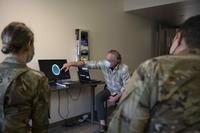 MILITARY UPDATE: TRICARE to Restore Coverage for Up to 40 Genetic Lab Tests
MILITARY UPDATE: TRICARE to Restore Coverage for Up to 40 Genetic Lab Tests
The Defense Health Agency, relying on medical laboratory experts and existing authority to conduct medical “demonstrations,” will restore TRICARE coverage this month for up to 40 genetic tests used in patient care.
Many of these laboratory-developed tests -- also called molecular pathology tests -- are viewed as medically necessary. But TRICARE had stopped reimbursing for more than 100 such tests in January 2013, believing it lacked authority to pay for them when such tests are ordered by civilian physicians delivering care through TRICARE provider networks.
Military treatment facilities have continued to order and pay for such tests routinely, which created a startling disparity of coverage between military direct care and purchased care contracts. Senior DHA officials acknowledged the coverage gap last February and vowed to close it.
The first step to do so will occur July 18 when “30 to 40” genetic tests, those “most commonly performed” across U.S. medicine, will become reimbursable again under TRICARE, as part of a three-year medical demonstration project, said Army Maj. Gen. Richard W. Thomas, chief medical officer and director of healthcare operations for DHA.
Among genetic tests to be restored to TRICARE coverage is one that determines if a woman who is pregnant, or desires to become pregnant, carries a genetic marker for cystic fibrosis. That marker would indicate increased risk that a newborn would have CF.
TRICARE stopped paying for this and many more laboratory-developed tests (LDTs) after adopting a policy that excluded coverage of any tests that is not approved by the Federal Drug Administration.
TRICARE maintained that LDTs would require approval by the FDA because of previously issued draft guidance asserting that LDTs constitute medical devices. The AMA and other physician organizations have opposed such policies arguing that these services constitute the practice of medicine and are not lawfully subject to FDA approval.
Civilian physicians continued to order such tests but after December 2012 TRICARE quietly began denying payments. For a time, many impacted laboratories absorbed the costs. But for some of the more costly tests ordered, TRICARE patients began receiving unexpected bills.
In a phone interview, Thomas explained that DHA earlier this year formed its own panel of experts, the Joint Lab Working Group, and began conducting its own review of safety and effectiveness of genetic tests. It used forensic science and other criteria to screen LDTs. One factor was whether major health insurance companies covered the tests, Thomas said.
Restored TRICARE coverage for up to 40 LDTs will occur under what DHA calls its Non-FDA-Approved Laboratory Test Demonstration Project, described in the June 18 Federal Register. A full list of genetic testing to be approved for TRICARE hasn’t been released yet. But coverage will be retroactive to Jan. 1, 2013, Thomas explained, so laboratories and patients will be able to apply for reimbursements of newly-cleared tests that they had paid for back to that date. DHA already has reimbursed impacted laboratories $3.5 million, mostly for prenatal CF testing the last 18 months.
During the demonstration, DHA would like to see Congress pass legislation to give it permanent genetic test review authority. The Senate Armed Services Committee’s version of the fiscal 2015 defense authorization bill contains such language, so it could be enacted into law by year’s end.
Besides closing its coverage gap, DHA plans to use the demonstration to better manage for military medicine the recent “explosion” in genetic testing, Thomas said. It will seek to hold down costs by using military labs with genetic testing capability when possible. Such labs now operate at military medical centers in Texas, Mississippi and Washington states.
DHA also wants to impose more “discipline and clarity” on use of such testing, whether by military health care providers or network civilian doctors.
“We’ve got to be flexible enough in our system that we can address these tests and certainly offer them, as appropriate, if they have proven clinical merit, are efficacious and safe,” Thomas said.
Prenatal cystic fibrosis testing is a good example. For now, DHA will extend coverage, acknowledging that such tests are recommended by the American College of Obstetricians and Gynecologists (ACOG). But during the demonstration, military patient outcomes will be studied to determine if CF testing provides real medical benefits or simply adds to the cost of care.
DHA officials had argued earlier this year that awareness that a fetus is at higher risk of cystic fibrosis usually has no impact on management of labor, delivery or neonatal care. Also, they noted, that at birth infants are tested for a host of health conditions immediately, including for CF.
Thomas described guidelines from ACOG as “deliberately opaque” on the benefits of prenatal CF screening. Yet because ACOG strongly recommends such screening, CF tests have become a “standard of practice” though not yet “a standard of care,” Thomas said.
Karen Ruedisueli, a health care advocate for National Military Family Association, said NFMA is pleased to see TRICARE restore coverage of some genetic tests, particularly prenatal cystic fibrosis screening, which represents the “bulk of genetic test denials” by TRICARE since early 2013.
But NMFA, she said, wants to learn why the DHA panel did not clear for restored TRICARE coverage more than 60 other genetic tests.
“That over half of those tests will continue to be denied coverage is concerning,” Ruedisueli said. “Because it’s our understanding the vast majority of those tests are covered by commercial insurance carriers as well as by other government plans.”
Send comments to Military Update, P.O. Box 231111, Centreville, VA, 20120, email milupdate@aol.com or twitter: Tom Philpott @Military_Update
# # # # #
Tom Philpott has been breaking news for and about military people since 1977. After service in the Coast Guard, and 17 years as a reporter and senior editor with Army Times Publishing Company, Tom launched "Military Update," his syndicated weekly news column, in 1994. "Military Update" features timely news and analysis on issues affecting active duty members, reservists, retirees and their families.
Visit Tom Philpott's Military Update Archive to view his past articles.
Tom also edits a reader reaction column, "Military Forum." The online "home" for both features is Military.com.
 Tom's freelance articles have appeared in numerous magazines including The New Yorker, Reader's Digest and Washingtonian. His critically-acclaimed book, Glory Denied, on the extraordinary ordeal and heroism of Col. Floyd "Jim" Thompson, the longest-held prisoner of war in American history, is available in hardcover and paperback.
Tom's freelance articles have appeared in numerous magazines including The New Yorker, Reader's Digest and Washingtonian. His critically-acclaimed book, Glory Denied, on the extraordinary ordeal and heroism of Col. Floyd "Jim" Thompson, the longest-held prisoner of war in American history, is available in hardcover and paperback.



